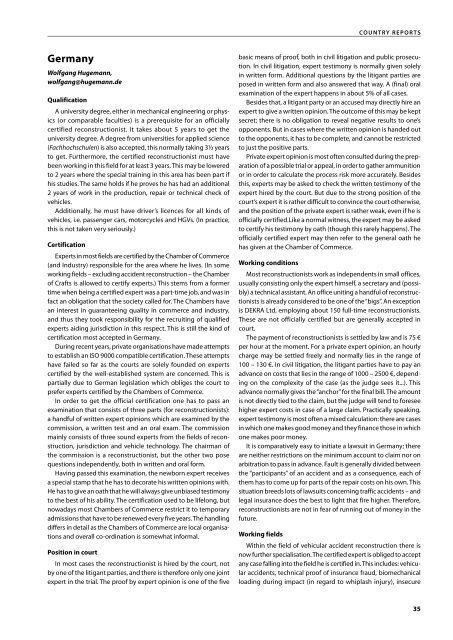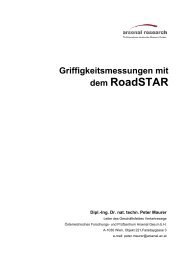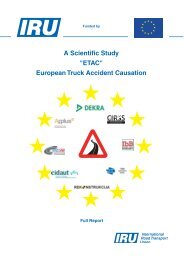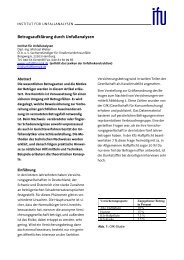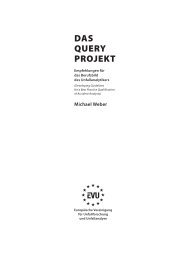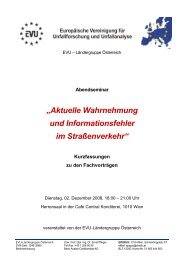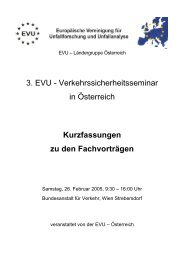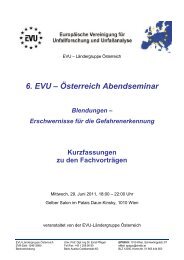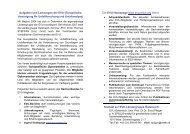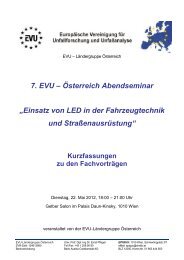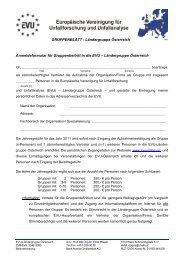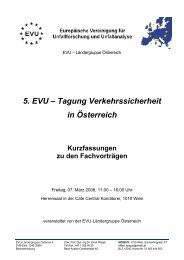THE QUERY PROJECT - European Commission - Europa
THE QUERY PROJECT - European Commission - Europa
THE QUERY PROJECT - European Commission - Europa
Create successful ePaper yourself
Turn your PDF publications into a flip-book with our unique Google optimized e-Paper software.
Germany<br />
Wolfgang Hugemann,<br />
wolfgang@hugemann.de<br />
Qualification<br />
A university degree, either in mechanical engineering or physics<br />
(or comparable faculties) is a prerequisite for an officially<br />
certified reconstructionist. It takes about 5 years to get the<br />
university degree. A degree from universities for applied science<br />
(Fachhochschulen) is also accepted, this normally taking 3½ years<br />
to get. Furthermore, the certified reconstructionist must have<br />
been working in this field for at least 3 years. This may be lowered<br />
to 2 years where the special training in this area has been part if<br />
his studies. The same holds if he proves he has had an additional<br />
2 years of work in the production, repair or technical check of<br />
vehicles.<br />
Additionally, he must have driver’s licences for all kinds of<br />
vehicles, i.e. passenger cars, motorcycles and HGVs. (In practice,<br />
this is not taken very seriously.)<br />
Certification<br />
Experts in most fields are certified by the Chamber of Commerce<br />
(and Industry) responsible for the area where he lives. (In some<br />
working fields – excluding accident reconstruction – the Chamber<br />
of Crafts is allowed to certify experts.) This stems from a former<br />
time when being a certified expert was a part-time job, and was in<br />
fact an obligation that the society called for. The Chambers have<br />
an interest in guaranteeing quality in commerce and industry,<br />
and thus they took responsibility for the recruiting of qualified<br />
experts aiding jurisdiction in this respect. This is still the kind of<br />
certification most accepted in Germany.<br />
During recent years, private organisations have made attempts<br />
to establish an ISO 9000 compatible certification. These attempts<br />
have failed so far as the courts are solely founded on experts<br />
certified by the well-established system are concerned. This is<br />
partially due to German legislation which obliges the court to<br />
prefer experts certified by the Chambers of Commerce.<br />
In order to get the official certification one has to pass an<br />
examination that consists of three parts (for reconstructionists):<br />
a handful of written expert opinions which are examined by the<br />
commission, a written test and an oral exam. The commission<br />
mainly consists of three sound experts from the fields of reconstruction,<br />
jurisdiction and vehicle technology. The chairman of<br />
the commission is a reconstructionist, but the other two pose<br />
questions independently, both in written and oral form.<br />
Having passed this examination, the newborn expert receives<br />
a special stamp that he has to decorate his written opinions with.<br />
He has to give an oath that he will always give unbiased testimony<br />
to the best of his ability. The certification used to be lifelong, but<br />
nowadays most Chambers of Commerce restrict it to temporary<br />
admissions that have to be renewed every five years. The handling<br />
differs in detail as the Chambers of Commerce are local organisations<br />
and overall co-ordination is somewhat informal.<br />
Position in court<br />
In most cases the reconstructionist is hired by the court, not<br />
by one of the litigant parties, and there is therefore only one joint<br />
expert in the trial. The proof by expert opinion is one of the five<br />
Co u n t R y R E P o R t S<br />
basic means of proof, both in civil litigation and public prosecution.<br />
In civil litigation, expert testimony is normally given solely<br />
in written form. Additional questions by the litigant parties are<br />
posed in written form and also answered that way. A (final) oral<br />
examination of the expert happens in about 5% of all cases.<br />
Besides that, a litigant party or an accused may directly hire an<br />
expert to give a written opinion. The outcome of this may be kept<br />
secret; there is no obligation to reveal negative results to one’s<br />
opponents. But in cases where the written opinion is handed out<br />
to the opponents, it has to be complete, and cannot be restricted<br />
to just the positive parts.<br />
Private expert opinion is most often consulted during the preparation<br />
of a possible trial or appeal, in order to gather ammunition<br />
or in order to calculate the process risk more accurately. Besides<br />
this, experts may be asked to check the written testimony of the<br />
expert hired by the court. But due to the strong position of the<br />
court’s expert it is rather difficult to convince the court otherwise,<br />
and the position of the private expert is rather weak, even if he is<br />
officially certified.Like a normal witness, the expert may be asked<br />
to certify his testimony by oath (though this rarely happens). The<br />
officially certified expert may then refer to the general oath he<br />
has given at the Chamber of Commerce.<br />
working conditions<br />
Most reconstructionists work as independents in small offices,<br />
usually consisting only the expert himself, a secretary and (possibly)<br />
a technical assistant. An office uniting a handful of reconstructionists<br />
is already considered to be one of the “bigs”. An exception<br />
is DEKRA Ltd, employing about 150 full-time reconstructionists.<br />
These are not officially certified but are generally accepted in<br />
court.<br />
The payment of reconstructionists is settled by law and is 75 €<br />
per hour at the moment. For a private expert opinion, an hourly<br />
charge may be settled freely and normally lies in the range of<br />
100 – 130 €. In civil litigation, the litigant parties have to pay an<br />
advance on costs that lies in the range of 1000 – 2500 €, depending<br />
on the complexity of the case (as the judge sees it...). This<br />
advance normally gives the “anchor” for the final bill. The amount<br />
is not directly tied to the claim, but the judge will tend to foresee<br />
higher expert costs in case of a large claim. Practically speaking,<br />
expert testimony is most often a mixed calculation: there are cases<br />
in which one makes good money and they finance those in which<br />
one makes poor money.<br />
It is comparatively easy to initiate a lawsuit in Germany; there<br />
are neither restrictions on the minimum account to claim nor on<br />
arbitration to pass in advance. Fault is generally divided between<br />
the “participants” of an accident and as a consequence, each of<br />
them has to come up for parts of the repair costs on his own. This<br />
situation breeds lots of lawsuits concerning traffic accidents – and<br />
legal insurance does the best to light that fire higher. Therefore,<br />
reconstructionists are not in fear of running out of money in the<br />
future.<br />
working fields<br />
Within the field of vehicular accident reconstruction there is<br />
now further specialisation. The certified expert is obliged to accept<br />
any case falling into the field he is certified in. This includes: vehicular<br />
accidents, technical proof of insurance fraud, biomechanical<br />
loading during impact (in regard to whiplash injury), insecure


